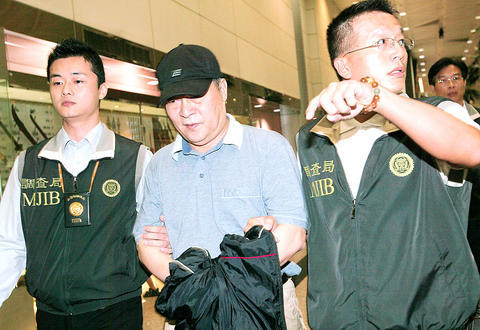Former Chinese Nationalist Party (KMT) legislator Chang Wen-yi (張文儀), who has been on the wanted list since December 2004 on charges of fraud, was repatriated from Macau yesterday, officials from the Ministry of Justices' Investigation Bureau said yesterday.
Chang, accompanied by bureau officials, arrived at Taiwan Taoyuan International Airport yesterday afternoon and was taken to a jail in Taichung, a bureau statement said.
COLLUSION

PHOTO: CNA
In September 2004, Chang received a one-year sentence for colluding with former Kuangsan Enterprise Group (廣三集團) president and former Taichung Business Bank (台中企銀) board chairman Tseng Cheng-jen (曾正仁) in an insider trading case.
Chang fled to China in August 2004 and was put on the wanted list that December.
Bureau officials said that Chang was believed to have been staying in Shanghai, where he allegedly made investments in and ran plasticware and footwear manufacturing plants.
Officials at the bureau tracked Chang as he was leaving from Shanghai for Macau, the statement said.
COOPERATION
After the agents informed Macau security authorities of the fugitive, local enforcement officials arrested him in the territory.
The bureau said that Macau authorities agreed to repatriate Chang in accordance with the Kinmen Accord.
Struck in 1990, the Kinmen Accord is a mechanism by which cross-strait illegal immigrants and criminals can be returned to their point of origin.
TRANSACTIONS
Chang and Tseng were involved in illegal stock transactions worth more than NT$8.4 billion (US$254 million) in 1997 while Chang served as chairman of a Kuangsan Enterprise Group subsidiary.
He was charged with violating the Securities Transaction Law (
Tseng was sentenced to 11 years in 2004 for embezzlement and other scandals before he fled to China.

SECURITY: As China is ‘reshaping’ Hong Kong’s population, Taiwan must raise the eligibility threshold for applications from Hong Kongers, Chiu Chui-cheng said When Hong Kong and Macau citizens apply for residency in Taiwan, it would be under a new category that includes a “national security observation period,” Mainland Affairs Council (MAC) Minister Chiu Chui-cheng (邱垂正) said yesterday. President William Lai (賴清德) on March 13 announced 17 strategies to counter China’s aggression toward Taiwan, including incorporating national security considerations into the review process for residency applications from Hong Kong and Macau citizens. The situation in Hong Kong is constantly changing, Chiu said to media yesterday on the sidelines of the Taipei Technology Run hosted by the Taipei Neihu Technology Park Development Association. With

‘FORM OF PROTEST’: The German Institute Taipei said it was ‘shocked’ to see Nazi symbolism used in connection with political aims as it condemned the incident Sung Chien-liang (宋建樑), who led efforts to recall Democratic Progressive Party (DPP) Legislator Lee Kun-cheng (李坤城), was released on bail of NT$80,000 yesterday amid an outcry over a Nazi armband he wore to questioning the night before. Sung arrived at the New Taipei City District Prosecutors’ Office for questioning in a recall petition forgery case on Tuesday night wearing a red armband bearing a swastika, carrying a copy of Adolf Hitler’s Mein Kampf and giving a Nazi salute. Sung left the building at 1:15am without the armband and apparently covering the book with a coat. This is a serious international scandal and Chinese

A US Marine Corps regiment equipped with Naval Strike Missiles (NSM) is set to participate in the upcoming Balikatan 25 exercise in the Luzon Strait, marking the system’s first-ever deployment in the Philippines. US and Philippine officials have separately confirmed that the Navy Marine Expeditionary Ship Interdiction System (NMESIS) — the mobile launch platform for the Naval Strike Missile — would take part in the joint exercise. The missiles are being deployed to “a strategic first island chain chokepoint” in the waters between Taiwan proper and the Philippines, US-based Naval News reported. “The Luzon Strait and Bashi Channel represent a critical access

COUNTERINTELLIGENCE TRAINING: The ministry said 87.5 percent of the apprehended Chinese agents were reported by service members they tried to lure into becoming spies Taiwanese organized crime, illegal money lenders, temples and civic groups are complicit in Beijing’s infiltration of the armed forces, the Ministry of National Defense (MND) said in a report yesterday. Retired service members who had been turned to Beijing’s cause mainly relied on those channels to infiltrate the Taiwanese military, according to the report to be submitted to lawmakers ahead of tomorrow’s hearing on Chinese espionage in the military. Chinese intelligence typically used blackmail, Internet-based communications, bribery or debts to loan sharks to leverage active service personnel to do its bidding, it said. China’s main goals are to collect intelligence, and develop a